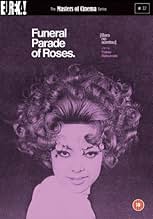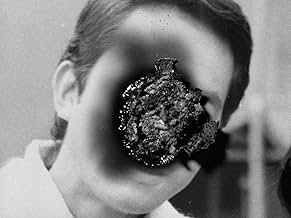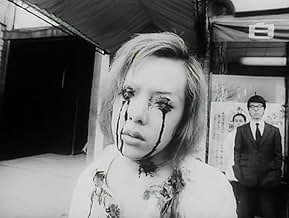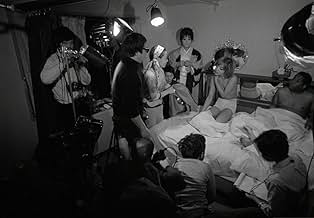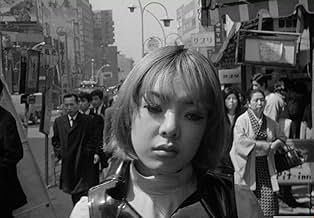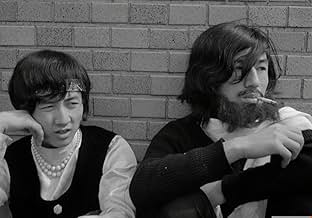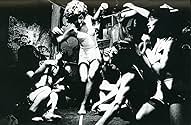IMDb-BEWERTUNG
7,7/10
8017
IHRE BEWERTUNG
Die Prüfungen und Trübsale von Eddie und anderen Transvestiten in JapanDie Prüfungen und Trübsale von Eddie und anderen Transvestiten in JapanDie Prüfungen und Trübsale von Eddie und anderen Transvestiten in Japan
Empfohlene Bewertungen
If you really are looking for a good time in a movie theatre - watch this movie ! It has been said that some of Kubrick's visual and sonic ideas for "Clockwork Orange" were inspired by this movie; after having seen it, i'm more than convinced that this is true.
This movie offers a lot of cinematic ideas and it uses surprising ways to make a point within a story.
What is the reason that films with a spirit and mood like that have vanished from the screen ? Have the politics in the movie industry really become so strict ? This movie watched nowadays has (but maybe had always) a subversive feel to it, why is that ?
It definitely offers something different and therefore would be very welcome in movie theatres and videostores around the world to free us from all the uninspired formula movies.
This movie offers a lot of cinematic ideas and it uses surprising ways to make a point within a story.
What is the reason that films with a spirit and mood like that have vanished from the screen ? Have the politics in the movie industry really become so strict ? This movie watched nowadays has (but maybe had always) a subversive feel to it, why is that ?
It definitely offers something different and therefore would be very welcome in movie theatres and videostores around the world to free us from all the uninspired formula movies.
I didn't know anything about this movie when a friend of mine recommended it in the most enthusiastic way. The guy is a a very young movie buff, with a keen interest in quality movies (experimental, avant-garde, new wave, independent, iconoclast, unorthodox, stuff like that). I share his interests (despite my old age), and any discussion we have is real brainstorming. Two days ago he told me about planning to organize kind of jam-session with friends of his age to watch a battery of movies (I declined the invitation: No Country for Old Men). "Funeral Procession of Roses" was mentioned in this context.
Back home I found references about the movie on the web, then a copy of the film on you Tube, with Spanish subtitles. I stayed long in night to watch the movie. Really a great cinematic experience. As I said, I didn't know anything about it, nor about director Toshio Matsumoto. A movie from 1969, belonging to the "Nuberu Bagu", the Japanese New Wave, recalling all I knew about that period in the history of Nippon cinema, first of all bringing back to my memory the four or five movies by Oshima that I had the chance to watch.
You say "Nuberu Bagu", you say Buñuel on the steroids; and the film of Matsumoto is no exception: the ending scene of "Funeral Procession of Roses" is a direct reference to the beginning of "Un Chien Andalou": tribute paid to the famous scene from Buñuel, also creative re-enactment, also shifting the sense of it toward new territory, toward Buñuel encountering Aeschylus and Sophocles on a street in Tokyo among busy passers-by.
It's not a movie for the sissies, this "Funeral Procession of Roses". It acts on multiple strata, and each strata is challenging. A movie solidly placed in the underground culture, exploring the gay universe - a night club of sorts with two drag queens in bitter conflict, the club owner trying to keep the balance between them. All this approached with a raw Neorealist eye, à la Fellini, à la Juan Antonio Bardem. Over the plot comes a documentary, every now and then the action is stopped and one or other of the actors is interviewed: a movie about trans genders, played by trans genders, how do they view their sexual condition, how do they relate with the movie they play in. Is it a documentary about a gay movie on the making? Is it just a documentary about the LGBT condition, using feature sequences to emphasize some points? Actually everything in the movie is left in an indeterminate state, and this is on purpose. Is it a feature or a documentary? Are the actors playing actors, a movie within a movie? Are those guys trans genders, or girls impersonating trans genders, or what? Is the paradigm of Oedipus (re-enacted in the movie in a quirky way) just what we know it is? Is this a supremely iconoclastic interpretation of Augusto Monterosso's "La cucaracha soñadora" - moved in a Tokyo gay bar of the sixties? ("There was a cockroach named Gregor Samsa who was dreaming he was a cockroach named Franz Kafka who was dreaming he was an author writing some story about a clerk named Gregor Samsa who was dreaming he was a cockroach"). Gosh, no!
And I think this is the ultimate meaning of the Funeral Procession of Roses: it speaks us about the frailty of our certitudes: be it reality versus illusion of reality, be it gender strict determination, be it our ultimate identity. "Mis circunstancias son como las suyas. Ésa es una de las razones"... Yep, not for the sissies.
Back home I found references about the movie on the web, then a copy of the film on you Tube, with Spanish subtitles. I stayed long in night to watch the movie. Really a great cinematic experience. As I said, I didn't know anything about it, nor about director Toshio Matsumoto. A movie from 1969, belonging to the "Nuberu Bagu", the Japanese New Wave, recalling all I knew about that period in the history of Nippon cinema, first of all bringing back to my memory the four or five movies by Oshima that I had the chance to watch.
You say "Nuberu Bagu", you say Buñuel on the steroids; and the film of Matsumoto is no exception: the ending scene of "Funeral Procession of Roses" is a direct reference to the beginning of "Un Chien Andalou": tribute paid to the famous scene from Buñuel, also creative re-enactment, also shifting the sense of it toward new territory, toward Buñuel encountering Aeschylus and Sophocles on a street in Tokyo among busy passers-by.
It's not a movie for the sissies, this "Funeral Procession of Roses". It acts on multiple strata, and each strata is challenging. A movie solidly placed in the underground culture, exploring the gay universe - a night club of sorts with two drag queens in bitter conflict, the club owner trying to keep the balance between them. All this approached with a raw Neorealist eye, à la Fellini, à la Juan Antonio Bardem. Over the plot comes a documentary, every now and then the action is stopped and one or other of the actors is interviewed: a movie about trans genders, played by trans genders, how do they view their sexual condition, how do they relate with the movie they play in. Is it a documentary about a gay movie on the making? Is it just a documentary about the LGBT condition, using feature sequences to emphasize some points? Actually everything in the movie is left in an indeterminate state, and this is on purpose. Is it a feature or a documentary? Are the actors playing actors, a movie within a movie? Are those guys trans genders, or girls impersonating trans genders, or what? Is the paradigm of Oedipus (re-enacted in the movie in a quirky way) just what we know it is? Is this a supremely iconoclastic interpretation of Augusto Monterosso's "La cucaracha soñadora" - moved in a Tokyo gay bar of the sixties? ("There was a cockroach named Gregor Samsa who was dreaming he was a cockroach named Franz Kafka who was dreaming he was an author writing some story about a clerk named Gregor Samsa who was dreaming he was a cockroach"). Gosh, no!
And I think this is the ultimate meaning of the Funeral Procession of Roses: it speaks us about the frailty of our certitudes: be it reality versus illusion of reality, be it gender strict determination, be it our ultimate identity. "Mis circunstancias son como las suyas. Ésa es una de las razones"... Yep, not for the sissies.
This is a movie that was made in the late '60s, early '70s period of Japan when Japan influenced by the Hippie culture was experimenting with their own brand of Avant Garde culture that was sometimes called "Angura". This is shortened Japanese pronunciation for "Underground". As the word suggests, these were experimental non-mainstream production that explored much about free sex, and anti establishment view of the world.
Gay culture was almost never picked up in Japanese movie up to this point, and it was first public exposure to the literally underground culture of the society at that time. This movie was also the debut for Pita or Shinnosuke Ikehata as Eddie. He has become somewhat of an icon for gay culture in Japan, but this movie was actually the first time he appeared as gay in public, and prior to that, he was only known as a beautiful boy dancer. His father was a natori of Japanese dance school, and he is a trained dancer himself.
Producers of this movie auditioned over 100 candidates, but couldn't find the right talent. Novel writer Tsutomu Minakami told the producers about "this boy" who was a go go dancer at a club in Roppongi. When the producers went to the club, and met the then 16 year old Ikehata, they knew they had the right person. Ikehata had a nick name Pita from Peter Pan, as he was so beautiful, and it was difficult to tell if he was a boy or a girl.
Story is bit convoluted, Eddie, who is the top host at the club Junne has intimate relation with the club's owner Gonda (Yoshio Tsuchiya). When the madam of the club Leda discovers this, he goes into a jealous frenzy, and tries to hurt Eddie. Eddie gets an idea to kill Leda, but that also brought back his suppressed memory of killing his own mother. Leda makes an attempt on Eddie's beauty by trying to cut his face, but fails. Gonda dumps Leda, and Leda commits suicide. But Gonda finds out the real truth about the relation between himself and Eddie.
The production of this movie is above average for avant garde movies made during this period. There's humor, talent, interesting point of view, and a real story. This is one of must see movies to come out of Japan.
Gay culture was almost never picked up in Japanese movie up to this point, and it was first public exposure to the literally underground culture of the society at that time. This movie was also the debut for Pita or Shinnosuke Ikehata as Eddie. He has become somewhat of an icon for gay culture in Japan, but this movie was actually the first time he appeared as gay in public, and prior to that, he was only known as a beautiful boy dancer. His father was a natori of Japanese dance school, and he is a trained dancer himself.
Producers of this movie auditioned over 100 candidates, but couldn't find the right talent. Novel writer Tsutomu Minakami told the producers about "this boy" who was a go go dancer at a club in Roppongi. When the producers went to the club, and met the then 16 year old Ikehata, they knew they had the right person. Ikehata had a nick name Pita from Peter Pan, as he was so beautiful, and it was difficult to tell if he was a boy or a girl.
Story is bit convoluted, Eddie, who is the top host at the club Junne has intimate relation with the club's owner Gonda (Yoshio Tsuchiya). When the madam of the club Leda discovers this, he goes into a jealous frenzy, and tries to hurt Eddie. Eddie gets an idea to kill Leda, but that also brought back his suppressed memory of killing his own mother. Leda makes an attempt on Eddie's beauty by trying to cut his face, but fails. Gonda dumps Leda, and Leda commits suicide. But Gonda finds out the real truth about the relation between himself and Eddie.
The production of this movie is above average for avant garde movies made during this period. There's humor, talent, interesting point of view, and a real story. This is one of must see movies to come out of Japan.
An all-night Italian TV program entitled "Fuori Orario" - which translates to "After Hours" - comprised of back-to-back films of all genres, nationalities and vintage, and hosted by an eccentric highbrow critic named Enrico Ghezzi - has for years been the fount of several interesting titles which, if it hadn't been for him, I would never have heard of, let alone watched (though I'd say that about a third of the alarming 500+ still-unwatched films I own on VHS are culled from that program!).
Anyway, FUNERAL PARADE OF ROSES is one such example: when I learned it was scheduled to be shown, I made a cursory search via the Internet about the film and, from the little I found, I singled it out as one to record. However, I didn't watch it immediately (mainly because, unfortunately, the tape I used for the recording was some 20 years old and still has a habit of halting playback automatically and subsequently refusing to load!; in fact, a couple of weeks back I lost two early Shohei Imamura films I unwisely taped on a similarly fragile VHS) but, since that time, I've come across a few more references to Matsumoto's film - most recently its being announced as a forthcoming Region 2 DVD release from the impressive "Masters Of Cinema" label - which have only intrigued me even more. Then, yesterday, as I was listening to Tony Rayns' Audio Commentary for Hiroshi Teshigahara's unusual debut PITFALL (1962) - incidentally a Eureka/MoC edition - he mentioned the film once again (and, perhaps unwittingly, proceeded to give away the devastating plot twist at the film's conclusion!) in the context of its similarly unconventional nature. So, this time, I decided not only to watch FUNERAL PARADE OF ROSES at long last - whatever the condition of the tape which, fortuitously, turned out to be not too bad - but, being in something of an art-house/Asian cinema vein, I made a whole list of (mostly just as obscure) titles to follow...
Now, after this long-winded introduction, let's get down to the business at hand: a potentially off-putting subject matter (the trials and tribulations of a community of transvestites) is transformed by the writer-director's aggressively experimental style, drawing on the contemporary free-form technique of European films rather than the cinematic conventions which are traditionally Japanese. In fact, the narrative (if it can even be called that, in view of its many flashbacks, flash-forwards and repeated actions) is frequently interrupted by having the cast sit down for interviews being filmed by a TV crew; interestingly, Ingmar Bergman's contemporaneous THE PASSION OF ANNA (1969) used a similarly unique device to "explain" his characters' motivations, as it were. Despite its generally serious tone, seemingly a requisite for an art-house film, FUNERAL PARADE OF ROSES is not devoid of humor or, at the very least, a distinct sense of the absurd: the catfight scenes between the "women" are shot in accelerated motion - a technique allegedly borrowed from this film by Stanley Kubrick for A CLOCKWORK ORANGE (1971)!; the scene of a trio of transvestites taking a leak in a men's lavatory (much to the consternation of those present); the linking image of a line-up of naked men with one of them having a rose firmly planted between his butt-cheeks; a revolutionary hippie named Guebara having a sneezing fit in extreme close-up; and the moment during one of the pauses for interviews when a crew member slinks past the camera filming the actor playing the man pretending to be a woman (are you confused yet?) holding a dead rat by the tail! With regards to Peter, the lead actor (who, amazingly, later turned up as The Fool in RAN [1985], Kurosawa's masterful adaptation of Shakespeare's "King Lear"), I have to say that he makes for a very convincing female impersonator - to the point where, if it weren't for his clearly masculine voice, one forgets that he's actually watching a man in drag! The love scenes (which, thankfully, aren't very explicit) are sensitively handled and, in general, the film doesn't sentimentalize the gay community - nor does it criticize the drug scene which seems to be as much a part of their lifestyle as anything else. As I said earlier, I knew of the film's reversal of Greek tragedy at the climax from Tony Rayns' commentary for PITFALL but, given its complex structure, I was still blown away by the revelation which, in turn, leads to an extremely violent ending that is not easily forgotten. By the way, I found the brownish hue of the black-and-white cinematography to be an interesting touch: I don't know if this was done intentionally, or whether it was just a feature of the print I happened to watch - but, at this juncture, I think I'd be somewhat disappointed if this unique "dirty" look were missing from the film once the upcoming DVD is released (perhaps anyone who might own the Japanese disc could chime in about this?)...
FUNERAL PARADE OF ROSES was, by all accounts, an remarkable debut feature for Toshio Matsumoto; he followed it with only 3 more films but, from the little I've read about them, they sound interesting too and well worth seeking out (so far they have only been available as part of a Japanese Limited Edition Box Set, though not all the films feature English subtitles!).
Anyway, FUNERAL PARADE OF ROSES is one such example: when I learned it was scheduled to be shown, I made a cursory search via the Internet about the film and, from the little I found, I singled it out as one to record. However, I didn't watch it immediately (mainly because, unfortunately, the tape I used for the recording was some 20 years old and still has a habit of halting playback automatically and subsequently refusing to load!; in fact, a couple of weeks back I lost two early Shohei Imamura films I unwisely taped on a similarly fragile VHS) but, since that time, I've come across a few more references to Matsumoto's film - most recently its being announced as a forthcoming Region 2 DVD release from the impressive "Masters Of Cinema" label - which have only intrigued me even more. Then, yesterday, as I was listening to Tony Rayns' Audio Commentary for Hiroshi Teshigahara's unusual debut PITFALL (1962) - incidentally a Eureka/MoC edition - he mentioned the film once again (and, perhaps unwittingly, proceeded to give away the devastating plot twist at the film's conclusion!) in the context of its similarly unconventional nature. So, this time, I decided not only to watch FUNERAL PARADE OF ROSES at long last - whatever the condition of the tape which, fortuitously, turned out to be not too bad - but, being in something of an art-house/Asian cinema vein, I made a whole list of (mostly just as obscure) titles to follow...
Now, after this long-winded introduction, let's get down to the business at hand: a potentially off-putting subject matter (the trials and tribulations of a community of transvestites) is transformed by the writer-director's aggressively experimental style, drawing on the contemporary free-form technique of European films rather than the cinematic conventions which are traditionally Japanese. In fact, the narrative (if it can even be called that, in view of its many flashbacks, flash-forwards and repeated actions) is frequently interrupted by having the cast sit down for interviews being filmed by a TV crew; interestingly, Ingmar Bergman's contemporaneous THE PASSION OF ANNA (1969) used a similarly unique device to "explain" his characters' motivations, as it were. Despite its generally serious tone, seemingly a requisite for an art-house film, FUNERAL PARADE OF ROSES is not devoid of humor or, at the very least, a distinct sense of the absurd: the catfight scenes between the "women" are shot in accelerated motion - a technique allegedly borrowed from this film by Stanley Kubrick for A CLOCKWORK ORANGE (1971)!; the scene of a trio of transvestites taking a leak in a men's lavatory (much to the consternation of those present); the linking image of a line-up of naked men with one of them having a rose firmly planted between his butt-cheeks; a revolutionary hippie named Guebara having a sneezing fit in extreme close-up; and the moment during one of the pauses for interviews when a crew member slinks past the camera filming the actor playing the man pretending to be a woman (are you confused yet?) holding a dead rat by the tail! With regards to Peter, the lead actor (who, amazingly, later turned up as The Fool in RAN [1985], Kurosawa's masterful adaptation of Shakespeare's "King Lear"), I have to say that he makes for a very convincing female impersonator - to the point where, if it weren't for his clearly masculine voice, one forgets that he's actually watching a man in drag! The love scenes (which, thankfully, aren't very explicit) are sensitively handled and, in general, the film doesn't sentimentalize the gay community - nor does it criticize the drug scene which seems to be as much a part of their lifestyle as anything else. As I said earlier, I knew of the film's reversal of Greek tragedy at the climax from Tony Rayns' commentary for PITFALL but, given its complex structure, I was still blown away by the revelation which, in turn, leads to an extremely violent ending that is not easily forgotten. By the way, I found the brownish hue of the black-and-white cinematography to be an interesting touch: I don't know if this was done intentionally, or whether it was just a feature of the print I happened to watch - but, at this juncture, I think I'd be somewhat disappointed if this unique "dirty" look were missing from the film once the upcoming DVD is released (perhaps anyone who might own the Japanese disc could chime in about this?)...
FUNERAL PARADE OF ROSES was, by all accounts, an remarkable debut feature for Toshio Matsumoto; he followed it with only 3 more films but, from the little I've read about them, they sound interesting too and well worth seeking out (so far they have only been available as part of a Japanese Limited Edition Box Set, though not all the films feature English subtitles!).
I am not a fan of avent-garde films, which I find are often pretentious and silly, but I enjoyed "Funeral Parade of Roses", primarily because I found the main character "Eddie" (played by Shinnosuke Ikehata aka "Peter") fascinating. The film is a non-linear composite of drama and documentary like vérité punctuated by abstract inclusions (jump cuts to stills, substitution splices, etc), some of which are more effective than others. Supposedly, Kubrick drew inspiration for "A Clockwork Orange" (1971) from this film and there are certainly some similarities (at one point Eddie looks straight at the camera through up cast eyes in a scene that reminded me of the iconic opening shot of "Alex" in Kubrick's film). Lacking much of a plot, "Funeral Parade of Roses" primarily peers into Tokyo's gay scene and follows Eddie, a transvestite 'bar girl' as he moves amoungst his friends (including pretentious auteur 'Guevara') in hopes of luring boss Gonda (Yoshio Tsuchiya) from rival, and bar 'Madame', Leda (Osamu Ogasawara), perhaps becoming 'Madame' himself. The black-and white cinematography is lovely, the characters intriguing and photogenic and the direction, for the most part, excellent (the interminable toking scene not withstanding). While the film is nonlinear, there is a traditional 'climactic' sequence at the end that is well worth waiting for and explains many of the references to the film being an Oedipal myth. Not to everybody's tastes but well worth trying out.
Wusstest du schon
- WissenswertesFuneral Parade of Roses (1969) gave Stanley Kubrick several visual and aural inspirations for his adaptation of Uhrwerk Orange (1971).
- PatzerAlle Einträge enthalten Spoiler
- VerbindungenEdited from Ecstasis (1969)
- SoundtracksO du lieber Augustin
Top-Auswahl
Melde dich zum Bewerten an und greife auf die Watchlist für personalisierte Empfehlungen zu.
- How long is Funeral Parade of Roses?Powered by Alexa
Details
Box Office
- Weltweiter Bruttoertrag
- 1.114 $
- Laufzeit
- 1 Std. 45 Min.(105 min)
- Farbe
- Sound-Mix
- Seitenverhältnis
- 1.37 : 1
Zu dieser Seite beitragen
Bearbeitung vorschlagen oder fehlenden Inhalt hinzufügen



